Button Shaped Fascinating Eyes of the Koalas
Koalas possess button-shaped eyes which are fully mysterious and fascinating to look. The eyes of koalas are button-shaped because they look just like two buttons on some teddy bear's face. Moreover; koalas have smaller eyes and in terms of their size as they are almost equal to the normal-sized small buttons.
Koalas have button-shaped fascinating eyes that are highly mysterious and fascinating to look.
Furthermore; koalas might have one of the smallest eyes (in proportion to their body mass) as compared to all arboreal mammals and also all the animals that are similar in size to koalas. The biggest dilemma about koalas' eyes is that their vision is not as good as other animals. This article tends to elaborate different attributes and features of the koalas' eyes such as their color, their functioning and vision power etc.
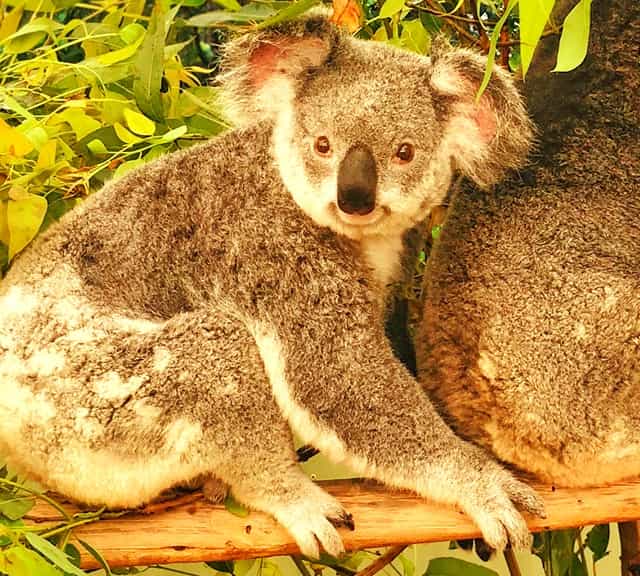
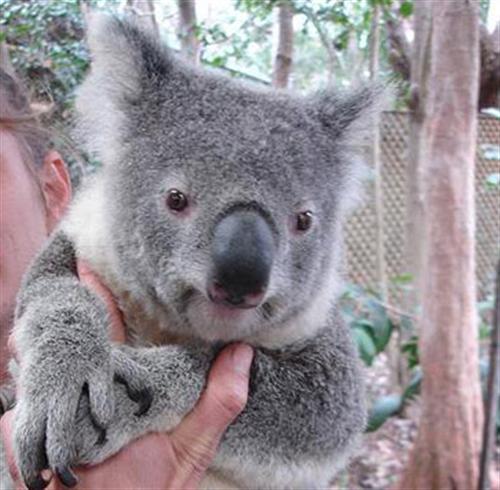
Upon analyzing the basic shape of their eyes, koalas usually possess rounded eyes (perfectly round) and they almost appear to be in perfect circular symmetry. At the first impression, if we analyze color of the koalas' eyes, they appear to be in some darker color i.e., black. However; a careful analysis reveals that the koalas' button-shaped fascinating eyes appear to be dark brown in color. In some cases, koalas have also been witnessed to have possessed the blue-colored eyes as well.
Koalas have rounded eyes which usually appear to be dark brown in color. However; koalas with blue-colored eyes have also been spotted as well.
The blue-colored eyes of koalas appear to be lighter and they can be easily differentiated from the dark-brown eyes of other koalas. Lastly; the white region (sclera) within the koalas' eyes is hardly visible but it does exist while hidden beneath the koalas' fur. Some koalas also have their eyes red or pink which is basically a disease (Red Eye Disease) within koalas.
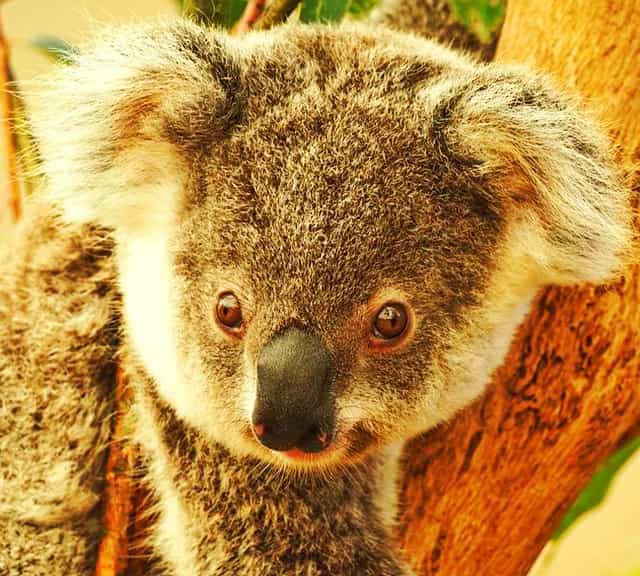
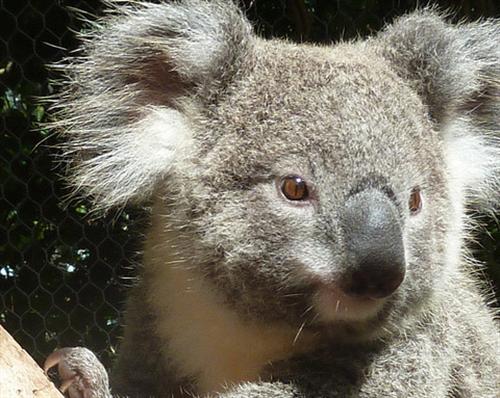
If we further look inside the koalas' eyes, we can see the presence of pupil within them. The koalas' pupil within the eyes appear to be vertically linear rather than rounded. Koalas also have the ability to expand and contract their pupils depending upon the situation. The biggest advantage of having vertical pupils in eyes is that they can manage too much brighter light very easily.
A black-colored vertical pupil is present within each eye of koalas. It is assumed that vertical pupils might give a better vision for koalas in night.
Furthermore; vertical pupils within eyes provide a better night vision. Perhaps this is the key reason that koalas usually feed on their favorite diet i.e., the Eucalyptus leaves, at night. However; many researchers believe that koalas have a very poor vision and they cannot see distant objects very clearly. Even they recognize their predators through their sense of smell and hearing.
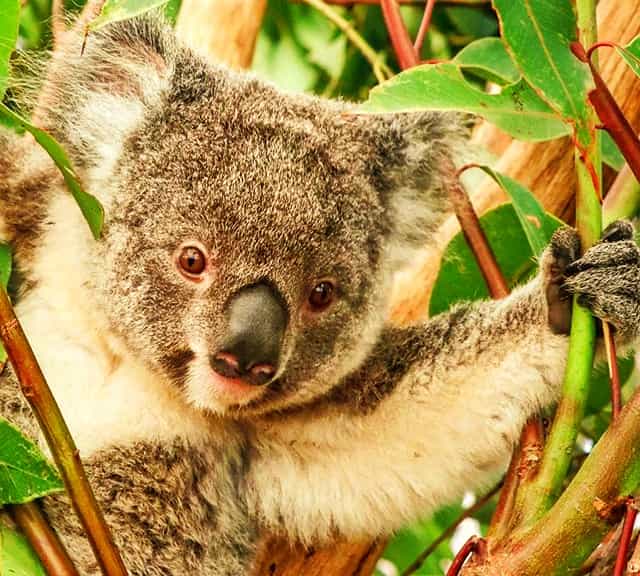
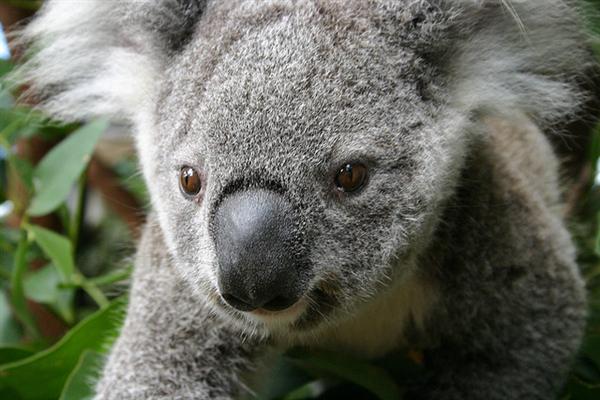
Another key feature about the eyes of koalas is that they possess the forward-facing eyes rather than the side facing eyes. Even though koalas have forward-facing eyes but their eyes work contrary to the generally assumed perceptions about the eye faces.
Koalas like humans have the forward-facing eyes rather than the side-facing eyes. Even though animals with forward-facing eyes have a very good vision but koalas have a very poor vision.
As a rule of thumb, it is generally assumed that animals with side-facing eyes like to run and hide while the animals with the forward facing like to hunt. However; koalas do not fit in this rule of thumb at all because they have forward-facing eyes and they do not hunt any other animals. Furthermore; several theories have proposed that animal with forward-facing eyes have extremely good depth of perception but koalas despite having front-facing eyes have a rather poor vision.
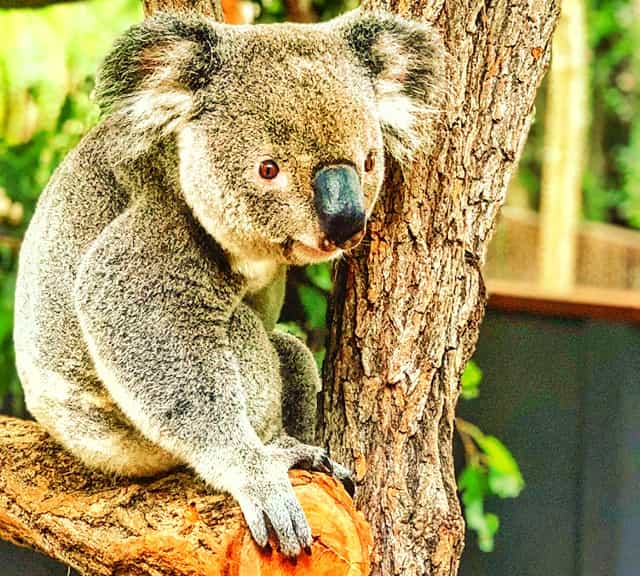
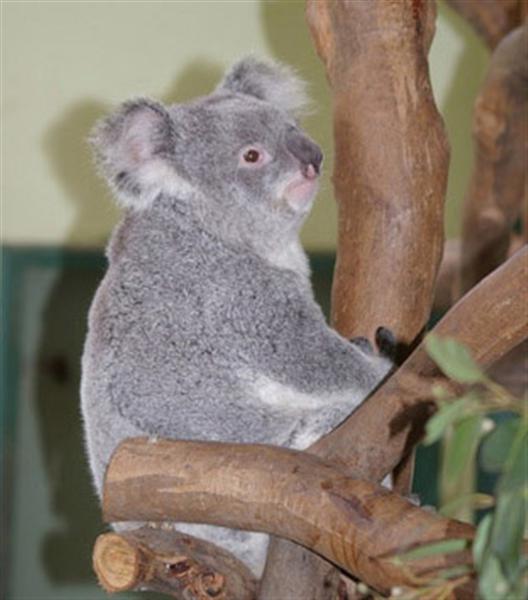
Experts also believe that koalas also do not need a very sharp vision within their eyesight because they do not have to hunt and only rely on the presence of the Eucalyptus leaves on trees. Furthermore; despite having poor eyesight, koalas are relatively safe from the predators' attacks because they mostly reside at trees which are very high from the ground level.
Despite the fact that the eyes of koalas are not equipped with a very sharp vision, they live a relatively peaceful life which barely involves predators.
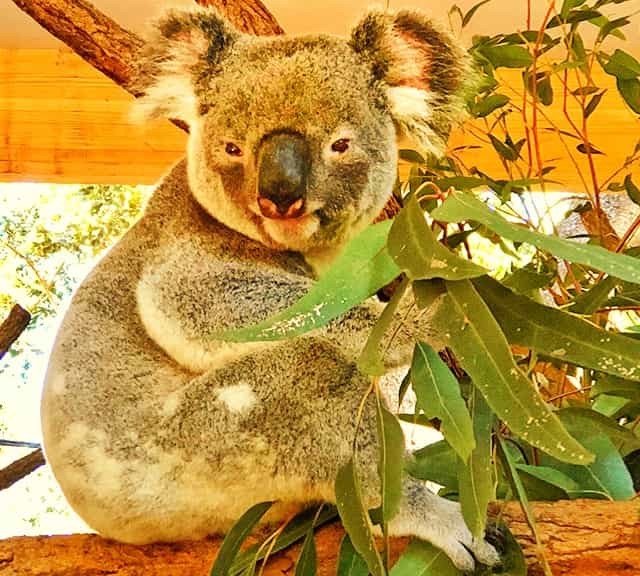
Experts believe that koalas mostly rely on their sense of smell to identify their predators rather than their eyes. Remember; koalas have very sharp sense of smell and it really helps them not only in selecting the fresh Eucalyptus leaves but also helps them to detect the presence of predators.
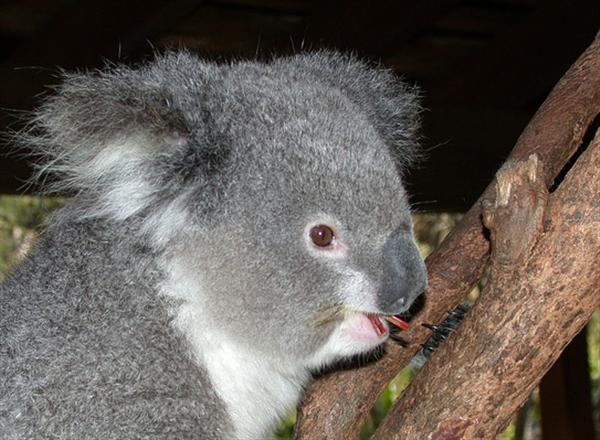
Koala observers have also noted that they barely blink their eyes and they continue to keep on staring curiously at objects which surprise them. However; koala observers also say that watching a blinking koala is one of the cutest observations to watch about koalas.
Koalas barely blink their eyes and they curiously focus on objects which surprise them. At birth koalas' button-shaped fascinating eyes just appear as dark circular spots.
Lastly; the eyes of koalas are barely developed at the time of their birth. However; circular spots which appear to be black in color are rather visible on their face. These spots continue to develop further, when they stay inside their mothers' pouch and they later (after few months) develop as the button-shaped fascinating eyes of koalas.
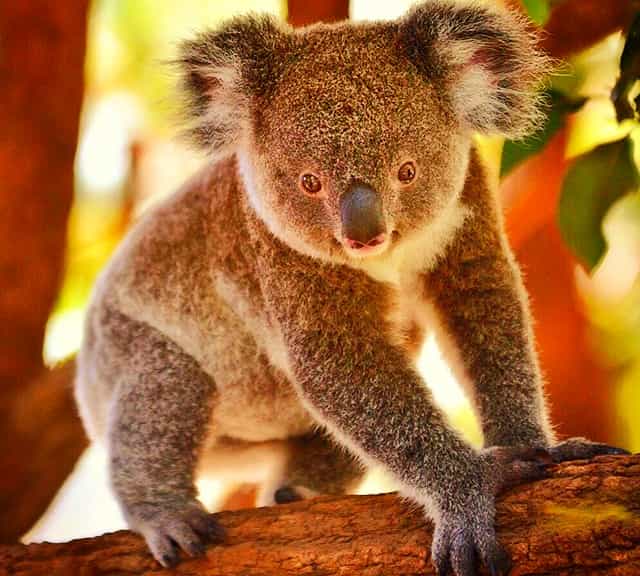
Liger Articles
Marsupials vs. Placental Mammals
Koalas are most popular animals in Australia
Koalas are more popular as compared to Kangaroos
Koalas and their Dominant Nose
Button Shaped Fascinating Eyes of the Koalas
Core Recognizing Features of Koalas
Koalas are the largest tree climbing Mammals in Australia - Koalas as Arboreal
Sizes of Koalas from Queensland, Australia
Sizes of Koalas from Australia's Victorian Origin
Difference between Queensland and Victorian Koalas
Average Weights of Male Koalas
Weighing Male vs Female Koalas
Male Koalas have Loudest of voice among all Australian Mammals
Origin of Koalas & their Evolution
Koalas Population Increased at the end of 20th century
Historical Evolution of the Koalas - A Physical Perspective
Koalas and their Aboriginal and Native Names
It Took 10 years for Aboriginal Australians to Spot and Recognize Koalas
Koalas Live Hardest and Toughest Lives Among all animals
Koalas Tooth Decay through its Abrasive Diet
Koalas Diet is Fully Poisonous and Toxic
Koalas' Food Eucalyptus has Lower Nutrition
Koalas have Lower Energy Levels
Koalas - When Occasionally Spotted on other Leaves for their Food
Why Koalas drink little or no Water?
Koalas & their Advanced Digestive Mechanisms
Why Koalas Sleep more than 20 Hours a Day?
Koalas Lack Energy and Strength
Koala's Tooth from Growth till Tooth Decay
Young Koalas are Better Chewers as Compared to Mature and Elderly Koalas
Why Most Koalas Die of Starvation?
Heat Exhaustion and Heat Strokes among Koalas
Do Koalas lack Intellectual Abilities?
Koalas and their Sense of Smell
Koalas Love Fresh Eucalyptus Leaves as their Food
Koalas' Eucalyptus Leaves' Preferences during summers and Winters
Koalas' Preference for Leaves Having Higher Nitrogen Levels
Koalas Prefer Big Eucalyptus Trees and Love to Stay at Trees' tops.
Koalas Prefer to Live in Areas that have Good Soil and Fertile Lands
Koalas' Per Day Food Consumption
Koalas Food Consumption Depends upon their Body Size
Lactating Female Koalas Consume More Food as Compared to the Normal Female Koalas
Koalas Consume More Food during Winters as Compared to Summers
Female Koalas are very Selective Regarding their Leaf Selection and Food Consumption.
A Baby Koala Joey Lives in her Mother's Pouch for 8 to 9 Months
Gestation Period within Female Koalas
Breeding Behaviors of the Female Koalas
The Size of the Baby Koala Joey at the time of its Birth
Weight of the Baby Koala Joey at the Time of its Birth
At Birth the Baby Koala Joey Travels from Cloaca into their Mother's Pouch
Newborn Koala Joeys have Well-Established Sense of Smell
Koala Joey keeps his Head Inside its Mother's Pouch for 6 Months
Complete Shape and Body Development of the Koala Joey
Pap - The first solid food of the Koala Joeys
When Does Tooth Emerge for Baby Koala Joey?
Aggressive Behavior of Mother Koalas towards their Joeys
Queensland Offers Less Nutritional Values for Koalas
How long does Koalas live? Age of the Koala
Female Koalas Live More than Male Koalas
What is the Average Age of the Male Koala?
Average Ages of the Female Koalas
For How Long a Female Koala can Give Birth to the Koala Joeys?
How many times female Koalas give birth?
Koalas and Australia's Bushfire
Koalas' fur quickly gets rid of rain water
Koalas Resting and Sleeping Postures and Positions during the Hot Summer Seasons
Winter Season and Sleeping Postures of Koalas
Koalas' Urination during Summer and Winter Seasons
Koalas and their Specialized Claws
How does a Koala regulate its Body Temperature?
Food Consumption and Feeding Timings of the Koalas
Koalas Always Prefer Eucalyptus Leaves from the Tree top
How does a Koala Grooms itself?
Koalas' Territories and ranges within Australia's Victorian Areas
Koalas' Territories and Ranges within Australia's Queensland Areas
Behavior of the Alpha Dominant Male Koala
Aggressiveness of Female Koalas
Scent Marking Behavior of the Male Koalas
Mating Strategy of the Male Koalas
Fights and Territorial Encounters of Male Koalas
Sounds and Vocalizations of Male Koalas
Sounds and Vocalization of the Female Koalas
Koalas and their Facial Expressions
Breeding Ages of the Male and Female Koalas
Factors Influencing the Success of Koalas' Fertility Rates
Behavior of the young and adolescent Koala Joey
When Does a Mother Koala Says Goodbye and Leaves the Young Koala Joey?
Playful Behavior of the Young Koala Joeys
Koalas - Mating Season and Mating Months
Koala Informationen, Bilder, Neuigkeit, und Erforschung
Коала - сумчатый млекопитающий